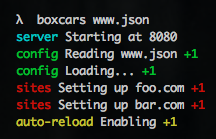It turns out, this is not a good idea and I don't maintain this project anymore.
Easy-to-configure Static Web/Reverse Proxy Server in Go.
$ go get github.com/azer/boxcars/boxcarsCreate a configuration file (it'll be auto-loading changes once you start) like the below example;
{
"foo.com": "/home/you/sites/foo.com",
"*.bar.net": "localhost:8080",
"qux.org": {
"/static": "/home/you/qux.org/static",
"/favicon.ico": "/home/you/qux.org/static/favicon.ico",
"/": "localhost:3000"
}
}And start the server:
$ boxcars config.jsonTo specify the port:
$ boxcars -port=8001 config.jsonAlways enable secure mode when running as sudo:
$ sudo boxcars -port=80 -secure config.jsonYou can change the configuration anytime during boxcars running. It'll be watching your file and reloading it only if it parses with no error.
I use below configuration for a static single-page app that connects to an HTTP API:
{
"singlepage.com": {
"/api": "localhost:1337",
"*": "sites/singlepage.com"
}
}To catch any domain:
{
"foo.com": "localhost:1234",
"*": "/home/you/404.html"
}To set a custom 404 page for a static server:
{
"foo.com": {
"/": "/home/you/sites/foo.com",
"*": "/home/you/404.html"
}
}Once you enable -secure, boxcars switches from root user to a basic user after starting the server on specified port.
$ sudo boxcars -port=80 -secure example.jsonUID and GID is set to 1000 by default. Use -uid and -gid parameters to specify your own in case you need.
Boxcars uses debug for logging. To enable logging for specific modules:
$ DEBUG=server,sites boxcars config.jsonTo see how boxcars setup the HTTP handlers for your configuration;
$ DEBUG=handlers-of,sites boxcars config.jsonTo enable very verbose mode (not recommended):
$ DEBUG=* boxcars config.jsonTo silentize:
$ DEBUG=. boxcars config.jsonIt'll be outputting to stderr.
Boxcars creates a lot of files on /proc/$pid/fd. In case you see boxcars crashing, you can see how many files are open by;
$ sudo ls -l /proc/`pgrep boxcars`/fd | wc -lTo find out your personal limit:
$ ulimit -nTo change it:
$ ulimit -n 64000You can change soft - hard limits by editing /etc/security/limits.conf.
- Add -daemon option.

